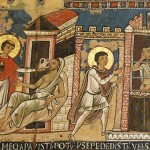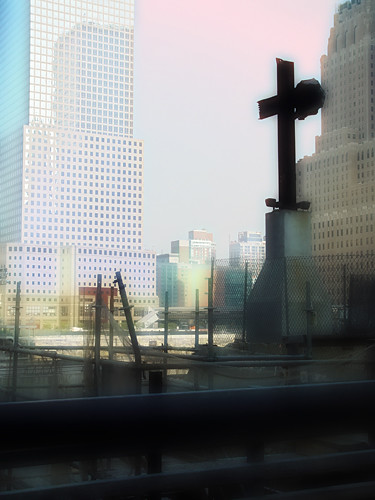We run our website the way we wished the whole internet worked: we provide high quality original content with no ads. We are funded solely by your direct support. Please consider supporting this project.
The Revolutionary Mission of the Church
Last week Greg tweeted the following:
YES! “[T]he mission of the church is to participate in a drama that has a cross for its climax…” K. Vanhoozer
This quote from Vanhoozer summarizes a theme that is crucial to the warfare view of the church that Greg holds. The drama of the church is a continuation of Jesus’ cross-like love, but what exactly does this look like? In Myth of a Christian Religion, Greg explains this by using the image of a revolution, but one of a different kind. He writes:
_______________________
When people get serious about their call to follow Jesus’ example, it’s revolutionary. Literally. The Kingdom that Jesus ushered into the world is a revolution. It revolts. In manifesting the beauty of God’s reign, the Kingdom revolts against everything in the world that is inconsistent with this reign.
But the Kingdom revolution is unlike any other the world has known. It’s not a revolution of political, nationalistic, or religious ideas and agendas, for Jesus showed no interest in such matters. Indeed, these “revolutions” are trivial by comparison to Christ’s, and whenever people have tried to transform the Kingdom into one of these revolutions they have trivialized the Kingdom and denied its essential character.
The revolutions of the world have always been about one group trying to wrest power from another. The revolution Jesus launched, however, is far more radical, for it declares the quest for power over others to be as hopeless as it is sinful. Jesus’ Kingdom revolts against this sinful quest for power over others, choosing instead to exercise power under others. It’s a revolution of humble, self-sacrificial, loving service. It always looks like Jesus, dying on Calvary for the very people who crucified him. …
While ordinary revolutions advance by engaging in ugly violence as they sacrifice all who oppose them, the Kingdom revolution advances by manifesting the outrageous beauty of God’s love that leads people to sacrifice themselves on behalf of those who oppose them.
The radical Kingdom Jesus embodied and established is all about manifesting the beauty of God’s love and revolting against every ugly thing that opposes it” (19-20).
Category: Q&A
Tags: Kingdom Living, Kingdom Revolution, Myth of a Christian Religion, Warfare Worldview
Topics: The Church
Related Reading

A Kingdom Not of This World
Bruxy Cavey spoke at Woodland Hills Church back in May as a part of the Tapestry series, and this is a little snippet of his sermon. It’s a wonderful description of the Anabaptist approach to politics. Take a look!

William Wilberforce and the Possibility of “Christian” Politics
William Wilberforce was a passionate Christian who entered politics for the sole purpose of ending the slave trade. For more than thirty years he passionately and courageous labored to get Parliament to outlaw the practice. His life’s dream was fulfilled a month before he died in 1833. It’s no surprise, therefore, that Wilberforce is frequently…

Wrecked for God
Idelette McVicker posted a blog on She Loves about getting wrecked for an ordinary, comfortable life. It’s a thoughtful piece on opening yourself to the world around you so that your heart breaks and your life is forever changed. From her blog post: Being wrecked for me, is facing my own brokenness and yet seeing God’s…

The Call to a Cruciform Life
Jesus repeatedly taught that following him meant that one had to be willing to “pick up their cross daily and follow [him]” (Lk 9:23; 14:27). Picking up our cross is the centerpiece of following Jesus because this was the centerpiece of what Jesus was all about. The thematic centrality of the cross is also illustrated…

What is the Warfare Worldview?
The warfare worldview is based on the conviction that our world is engaged in a cosmic war between a myriad of agents, both human and angelic, that have aligned themselves with either God or Satan. We believe this worldview best reflects the response to evil depicted throughout the Bible. For example, Jesus unequivocally opposed evils…

Everybody’s Got a Prequel
My wife and I, along with some friends, recently attended the Broadway Play Wicked. Without giving too much away, I’ll tell you the play attempts to answer the question: What could have possibly made the “Wicked Witch of the West” so [apparently] evil (as presented in the original Wizard of Oz)? After all, normal young…

